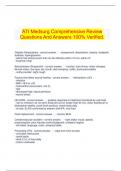ATI Medsurg Comprehensive Review
Questions And Answers 100% Verified.
Diabetic Ketoacidosis - correct answer. - assessment: dehydration, ketosis, metabolic
acidosis, hyperglycemia
- admin fast acting insulin that can be effective within 10 min, admin IV
- kussmaul resp
Beta blockers (Propanolol) - correct answer. - monitor: sore throat, vision changes,
blurred vision, dry eyes, dry mouth, abd cramping, colitis, acute pancreatitis
- notify provider: night cough
Factors that affect wound healing - correct answer. - dehydration (UO)
- infection
- BMI <18.5 or >25
- malnutrition (low protein, vita C)
- age
- decreased hgb, tissue perfusion
- wound stress
HIV/AIDS - correct answer. - positive response to treatment monitored by viral load
- risk for infection: do not drink fluids left out for longer than 60 min, clean toothbrush in
dishwasher weekly, avoid fresh produce, check temp daily
- dx test: ELISA confirmed by western blot/IFA, viral load
Fluid replacement - correct answer. - monitor BUN
Cerebrovascular accident - correct answer. - right sided: visual, spatial,
proprioception; poor impulse control/judgment; unilateral neglect
- left sided: language, math, analytical skills
Preventing UTIs - correct answer. - wipe from front to back
- void after intercourse
- avoid baths
- drink 2-3 L of fluid daily
- cotton underwear
, - urinate Q2-4h
Radiation therapy - correct answer. - do not remove ink markings
- wash area gently with warm water and mild soap
- avoid sun esposure for 1 year
- dispose body fluids in lead container
- limit visits to 30 min a day
- staff should wear dosimeter badge to monitor exposure
- keep all soiled linens in room until implant is removed
Kidney transplants - correct answer. - hemodialysis sometimes needed following
surgery because kidneys from deceased donors may not function immediately
- requires lifelong immunosuppressive therapy
- complications: cardiovascular disease
Hemodialysis - correct answer. - expected: weight loss, decrease BP, increase temp
- complications: hypocalcemia, bleeding, infection, hypovolemia, anemia
- disequilibrium syndrome: nausea, restlessness, dysrhythmias, seizures, headache
- notify: headache, nausea, dizziness during dialysis
- do not eat during dialysis
Inotropic medications - correct answer. - dopamine, digoxin, dobutamine, milirinone
- increase contractility and improve CO
- monitor HR (apical), hold if <60 min
Diabetes inspidus - correct answer. - deficiency in ADH
- inability to concentrate urine, 1.001-1.005
- assessment: hypotension, weak peripheral pulses, polydipsia, polyuria (4-30L/day),
nocturia, dehydration
- DILUTE urine chemistry, CONCENTRATED serum chemestry
- treatments: desmopressin, vasopressin (synthetic ADH)
- complications: CNS damage, serizures
Heart failure - correct answer. - monitor daily weight and i/o
- prevention/health promotion: exercise regularly, consume diet low in Na, fluid
restrictions, smokin cessation
- left sided HF r/t hypertension, CAD, angina, MI, valvular disease... decreased systemic
perfusion
- right sided HR r/t left sided HF, pulmonary problems, right ventricular MI
- **fluid will be backed up in the system behind the failure (Left in Lungs, right in body)
Esophageal varices - correct answer. - do not strain to have BM
- avoid using table salt to season food
Blood transfusion - correct answer. - prime line with NS
- verify with 2 nurses




